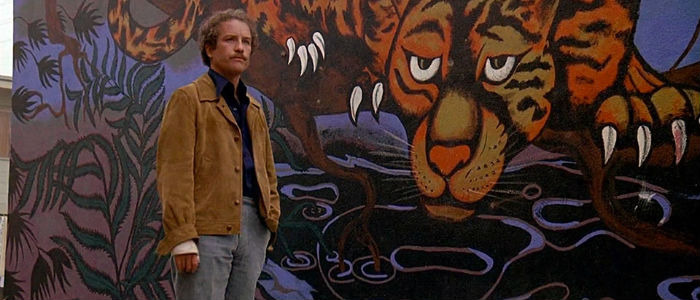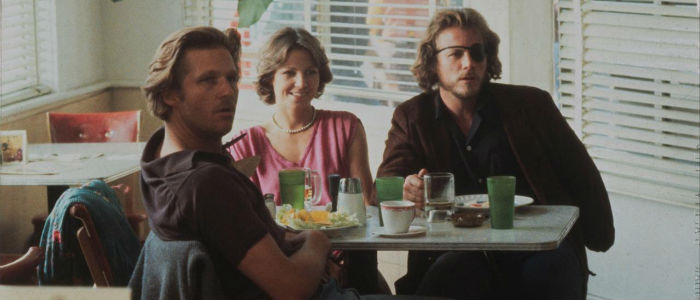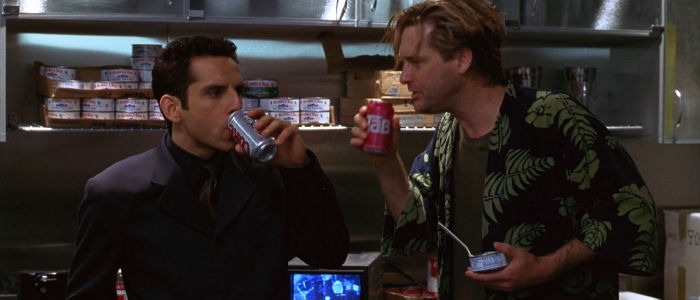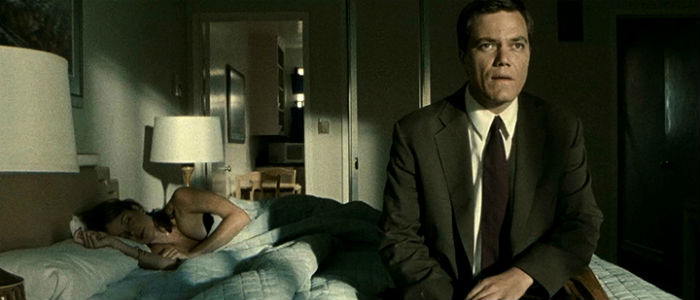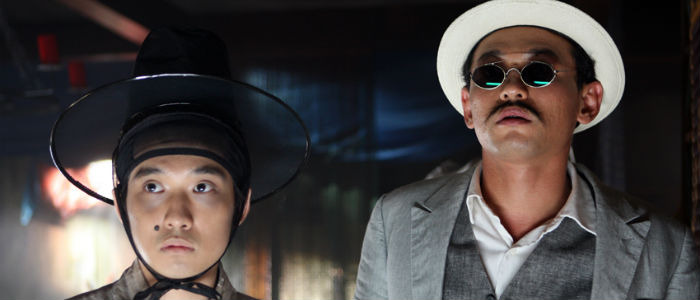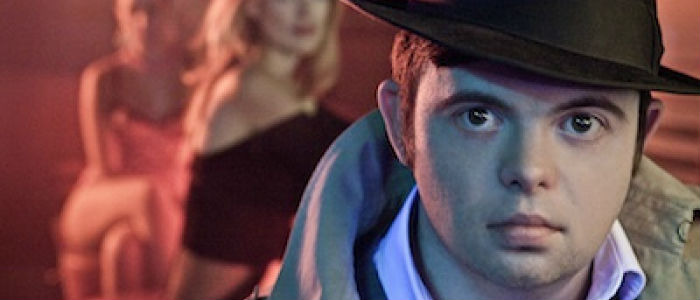The Best Private Eye Movies You've Never Seen
(Welcome to The Best Movies You've Never Seen, a series that takes a look at slightly more obscure, under-the-radar, or simply under-appreciated movies. This week sees us dig into the gumshoe game with a look at some private eye flicks worth seeking out.)
A new Sherlock Holmes film opens later this month, and while it's one played almost exclusively for laughs its core element — a private detective solves a mystery! — remains intact. Arthur Conan Doyle's 1887 creation is probably the most famous such character, but his (probable) inspiration and "American" private eye type as we know and love it actually arrived three decades earlier from the mind of Edgar Allan Poe. It's true! His amateur crime-solver has inspired numerous others in the many decades since, and while C. Auguste Dupin has a very limited presence on the big screen others have made the leap and gifted viewers with some truly incredible films ranging from suspense to comedies to dramatic thrillers.
Harper (1966), Klute (1971), Chinatown (1974), Night Moves (1975), and Who Framed Roger Rabbit (1988) are some of the best there are, and if you've yet to see any of them I suggest you make it a priority to fix that sooner rather than later. For now, though, I want to recommend a few that aren't considered classics and deserve to be a bit more popular.
Keep reading for a look at six very good to great movies about private eyes that you've probably never seen.
The Big Fix (1978)
Moses Wine (Richard Dreyfuss) was mildly rebellious back in college, but these days he's a divorced private eye with two kids, outstanding bills, and the need for a job. One comes knocking in the form of an old flame who wants his help finding an ex-classmate turned convicted radical who's currently part of an effort to disrupt a state-wide election. Or is he?
Roger L. Simon's novel comes to the screen with a tone that shifts pretty succinctly nearly halfway through the film. It starts as a casually comedic character piece where the plot feels almost secondary, and while it's not to the same degree as something like The Long Goodbye it still doesn't quite feel weighty at first. It's loose and funny, and Moses is anything but hardcore — he keeps his gun in the glove compartment of his car with the cylinder removed and a crayon stuffed in the barrel. Things get serious quickly, though, and soon Moses isn't laughing much at all. Bomb threats, murder, and betrayal all rear their heads in a satisfying story of a little investigator on a big case.
A major part of the film's enjoyment comes in its casting starting with Dreyfuss as something of an atypical P.I. He's a short wise-ass who handles the aforementioned tone shifts perfectly — he's asked repeatedly about his bandaged hand, something he has in the very first scene, and his answer evolves humorously until the final reveal. It's always great seeing Bonnie Bedelia, and while her role is small she makes her mark. John Lithgow is equally compelling as a guy who probably knows more than he's letting on, and F. Murray Abraham shows up as the radical everyone's searching for. Sharp-eyed viewers will also notice John Carpenter-regular Frank Doubleday as a gun-toting thug and Mandy Patinkin as "Pool Man."
The Big Fix is not currently available.
Cutter's Way (1981)
Bone (Jeff Bridges) sees something dumped in an alleyway and learns the next day that it was a body. He tells his friend Cutter (John Heard) that he thinks a local and highly connected businessman is the man who did the dumping, and soon the pair of amateur sleuths are connecting the dots behind a murder conspiracy.
This might be a slight cheat as neither Cutter nor Bone are officially private eyes, but like the Hardy Boys before them they do take naturally to the art of the investigation. There are some bumps along the way, of course, as Cutter's anger over all he lost in Vietnam — an eye, a hand, a leg — fuels some poor decisions and a misguided attempt at blackmail, but their dogged determination leads to some dark revelations and turns.
No film from outside of the 1970s has ever felt more like a 70s film. It's beautifully made, terrifically acted, and cynical as hell, and its ending is guaranteed to leave some in awe and others frustrated. There are brutal truths at its core, an inescapable honesty about the United States most of us live in, and it forces us to root for characters we hold little hope for. Bridges and Heard are both damn good here with performances both subtle and raw, but it's Lisa Eichhorn as Cutter's wife who captures our hearts before crushing them. Who knew searching for a killer could be so damn devastating.
Cutter's Way is available on Blu-ray, DVD, and streaming.
Zero Effect (1998)
Daryl Zero (Bill Pullman) is the world's greatest detective if he does say so himself, and his idiosyncratic behaviors don't change that. He doesn't like to meet his clients, he loves Tab, and he essentially solves his cases through his assistant Steve Arlo (Ben Stiller). His isolated and observant world is about to be shaken, though, when a blackmailing case reveals some dark truths about others while shedding new light on himself.
Writer/director Jake Kasdan's debut disappeared quickly in theaters but has gone on to find a kind of cult success in the past decade. And deservingly so, too, as it's a funny riff on the Sherlock Holmes formula that adds big laughs and an engaging mystery to a sharp character study. Zero is a genius and something of a prick at the same time, but while the case at hand unfolds it's the peeling back of his own layers that holds our attention.
Both Pullman and Stiller have shown strong comedic chops throughout their career, and while the film brings the funny both actors also get to flex their dramatic muscles with characters who feel more human in their arcs than the genre typically allows. Both characters grow in satisfying ways without getting in the way of story, humor, or thrills. It a better world it would have gotten a sequel by now, but in this world, we got follow-ups to both Independence Day and Zoolander instead.
Zero Effect is available on DVD and streaming.
The Missing Person (2009)
John Rosow (Michael Shannon) fills his days and nights with alcohol, cigarettes, and the occasional investigation for cash money. He's hired to follow a man on a train trip and then asked to return him to New York City, but the simple job takes a turn when he hears the man's story. It seems he was one of the missing after 9/11 and declared dead, and he has no interest in coming back home.
This is something of an atypical private eye movie in that there's really not much to the mystery. There are still some revelations as certain motives come to light, but the traditional mystery is nowhere to be found. The man John's following is rarely out of his sight from early on, and instead the film makes it clear that the missing man of the title may not be quite what expected. The film's language is fluid as it explores what it means to be a man, what it means to be missing, and what it takes to be found again.
Shannon is key to it all working despite the unconventional genre narrative as he expresses gnawing anguish better than most actors. His pain is real, and it fills every scene alongside the cigarette smoke. He's far from a typical leading man — although I love it when he lands a leading role — and that too plays into it as despite possibly looking the indifferent private eye type his mannerisms betray a man more in tune with his anger and sadness. It's a compelling performance in a slow burn tale about the things that get taken from us and the things we leave behind.
The Missing Person is available on DVD and streaming.
Private Eye (2009)
A young medical student in early 20th century Korea stumbles across a body in the woods, and school supply costs being what they are he takes it home for a practice autopsy instead of reporting it to police. The corpse turns out to be the murdered son of an important politician, so the student hires a private eye to help catch the killer and clear his own name.
This feels every bit like a noir private dick meets young Dr. Watson, and the result is a fantastic thriller that immerses viewers in the period and the genre. We're even introduced to a Q-like character gifting our heroes with gadgets to aid in their sleuthing, and her presence as an aristocratic lady (and badass archer) adds to the thrill. The film builds its mystery layer by layer with clues and commentary on class and punctuates it all with some grim visuals, exciting action beats, and a rousing finale.
Things become a bit convoluted in the third act while also wrapping up far too easily, but the highs far outweigh the lows. Beautiful set-pieces and cinematography along with a fine attention to period detail help create the world, and our heroes run roughshod through it all in pursuit of a very ugly truth. It's still a crime that this fun thriller both failed to find a US release and never got a sequel, but it remains worth the effort to find it.
Private Eye is not currently available (unless you're down with Tubi).
Detective Downs (2013)
Robert (Svein André Hofsø) is one hell of a private eye. Probably. He looks the part with a fedora, a trench coat, and a preference for missing person cases, but he's never actually been hired to find someone. Until now. A woman arrives at the group home where Robert lives — did I mention he has Down Syndrome? — and she insists he find her missing husband.
As should probably be expected, this is no hardcore, serious tale. Fears that the film could turn insensitive and exploitative are quickly squashed in its good-natured antics and sweetness, and while some of it comes from the script the bulk of the film's heart comes straight out of Hofsø's performance. There's real and sincere emotion there, and while it most immediately bolsters our affection it also serves the character extremely well. His method is to step into the missing person's life by way of their clothes, home, and family, and when he shares his plan to the man's mother he does so with a hug and a promise. It's a touching scene, and it accentuates the film's tone.
Robert sees similarities in the man's life to his own, and it affects the way he approaches the case. He's fully aware of his supposed limitations but refuses to be boxed in by them. Neither he nor his character ask or need anyone to feel sorry or pity, and instead he delivers honesty and joy in his interactions. And not for nothing, but his spontaneous dance scene in the park is as happy and life-filled a segment as you're likely to see.
Detective Downs is not currently available.
Read more Best Movies You've Never Seen!

